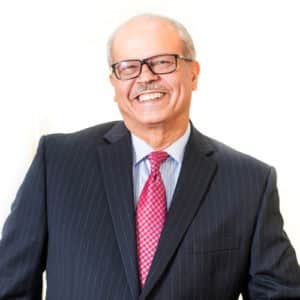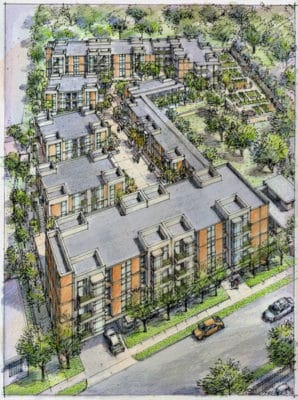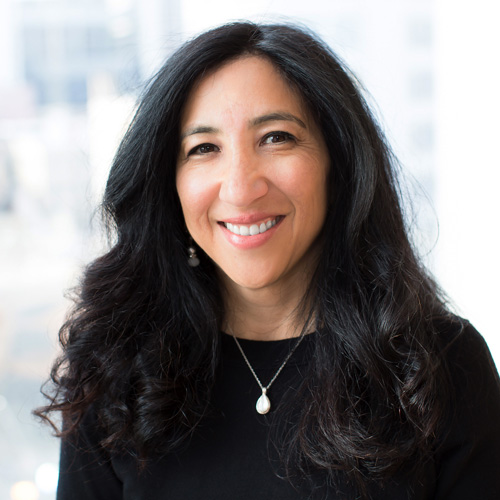
Raul Russi describes himself as “un jíbarito del barrio de Apeadero,” a rural neighborhood in Patillas, Puerto Rico that is only accessible by foot. Now, in the much more urban surroundings of his office in the Bronx, he keeps a photo of his childhood house, a small wooden building with a zinc roof in the middle of thirty acres of mountain land. Looking at the photo, he remembers growing up surrounded by mango and orange trees, pineapples, green plantains, and sugar cane. Apeadero had no electricity or running water, but he remembers having a happy childhood, surrounded by his extended family and living off the land. Russi, whose time is quite valuable these days, makes sure not to spend too much time daydreaming about Apeadero, but his upbringing is a key part of who he is and how he leads.
As Acacia Network’s CEO, Russi is at the helm of the leading Latino integrated-care nonprofit in the United States. Acacia’s headquarters are in New York City, with offices in Buffalo and Albany, New York; Orlando, Florida; and Puerto Rico. The nonprofit works through five main product lines: healthcare, transitional housing, social services and education, affordable housing, and economic and business development.
In 2016, three new affiliates became part of the Acacia family. One is the Institute for the Puerto Rican/Hispanic Elderly Inc. (IPRHE), which is a citywide multiservice organization serving the New York Latino and other ethnic/racial minority older adults and their families. The second is East Harlem’s Greenhope, which provides alcoholism and substance abuse programs and supportive housing for predominantly low-income African American and Latina ex-offenders. The final affiliate is Seedco, a national nonprofit organization that advances economic opportunities for people, businesses, and communities in need.
Since Hispanic Executive interviewed him in 2013, Russi has worked tirelessly to ensure Acacia continues to build upon the collective achievements to increase economic opportunities for everyone. For him, healthcare, housing, and economic development opportunities are the key for creating healthy and prosperous neighborhoods.
A Major Player in Affordable Housing

Of the many projects and successes achieved in 2016, Russi’s major highlight is the nonprofit’s expansion to Puerto Rico through its affordable housing division.
Puerto Ricans are leaving the island in waves, and the economic situation is devastating the island. Russi, with his tenacity and fierce leadership style, went back to make a contribution.
“We never stop being Puerto Ricans,” he says, remembering how his family left Puerto Rico for Buffalo, New York, in the late 1950s. “When one suffers, we all suffer a little. And when a little island that gave birth to all of us is suffering, then all of us—no matter where we are—work together to resolve the issues of Puerto Rico.”
Affordable housing is a need across the island, especially for seniors. After working four years and investing $1.5 million in predevelopment costs, Acacia’s affordable housing division broke ground with a major affordable housing development in Toa Alta, Puerto Rico: Palacio Dorado, a 103-unit senior housing project. Construction started last November and completion is expected in September 2018.
Russi is already looking for other ways to contribute to the island. “The need is too big, the opportunity is now, and I am ready to go back and contribute at a larger scale,” he says. “I will find a way; there is always a way to contribute.”
Palacio Dorado—along with Acacia Gardens, a building consisting of 178 affordable units located in New York City—positioned Acacia as a major player in the affordable-housing world. This is not easy to achieve, especially when nonprofits are competing with for-profit developers for the same affordable housing developments.
The Acacia Transitional Housing Division has been a major contributor to addressing the New York City homelessness problem through increased capacity from an original 135 units to more than 3,520. In 2016, this division alone touched the lives of more than seven thousand people, helping many return to permanent housing and employment. The social services division diversified to include licensed day care to 250 children, academic achievement after school programs for 1,500 students, and seven senior centers.
At the Forefront of Healthcare
The Ramon S. Velez Health Center, located in the Bronx, is another successful opening for Russi and Acacia. The center offers primary-care and specialty services to women, children, and families. The center offers an on-site pharmacy and lab, as well as licensed outpatient treatment programs from the NYC Office of Alcoholism and Substance Abuse Services (OASAS). Ramon Velez is the newest addition to the seven family health care centers, five of which are federally qualified health centers.
Acacia’s health centers are at the forefront of healthcare transformation by integrating primary healthcare with behavioral health, providing on-site specialty care, ensuring care coordination, and improving individuals and communities’ overall health, Russi proudly says. Three of the network centers were second in the country to receive the highest level of patient-centered medical home recognition. Combined, all the centers provide primary and specialty care to more than fourteen thousand people.
For all Acacia has recently done for seniors and other populations in need, its mainstay programs tend to focus on the needs of drug abusers, ex-offenders, and other groups that are treated with enormous caution when grants are issued.
“We never stop being Puerto Ricans. When one suffers, we all suffer a little. And when a little island that gave birth to all of us is suffering, then all of us—no matter where we are—work together to resolve the issues of Puerto Rico.”
Raul Russi
So the nonprofit’s substance abuse treatment center expansion into the New York cities of Albany and Buffalo—Camino Nuevo and Alba de Vida, respectively—were started without government assistance. With the devastation of the heroin epidemic being felt in both communities, Russi was eager to take “a very negative situation” and parlay it into an opportunity to fuel the wellness of the community.
Acacia’s behavioral health division also successfully expanded capacity in New York City by creating a full continuum of care currently represented by twenty-one licensed OASAS treatment programs, seven licensed office mental-health treatment programs, and an increased capacity of 644 beds for the supportive housing program.
These programs, along with the centers in Albany and Buffalo, serve more than eight thousand people annually, and the care coordination health homes located in the Bronx and Buffalo ensure quality care for 1,800 people with chronic illness.
Strengthening Latino Communities
In his 2013 Hispanic Executive interview, Russi said that throughout his career in the police department, local politics, and nonprofits, “I was always trying to change the influence of Latinos wherever I went.” As he reflects on Acacia’s achievements and growth from the past few years, he agrees that he has the influence to strengthen Latinos’ community participation.
One way he has done so is through the newly acquired Centro Borinqueño in Orlando, Florida. The property consists of a two-story banquet hall/auditorium facility, which was an iconic center for the Puerto Rican community and put off for foreclosure and about to disappear. Russi received a call to visit Orlando and the building.
Russi came back to New York City convinced that the center needed to be completely revamped and open to the community.
“We knew the importance of preserving the roots of who we are,” he says. “And we found a new group of interesting young people eager to make the center a cultural hub for the Latino community.”
He believes that it is important for Latinos to have a seat at the table and to work together as one Latino nation. His dream is to open doors to ensure the next generation continues the work to reinvest in their communities by bringing innovation and creativity to, most importantly, get the job done.
Russi dreams of an Acacia that is in every community and in every neighborhood, preserving, creating, and serving the Latino community. Maybe then, he will return to his farm at Apeadero.
